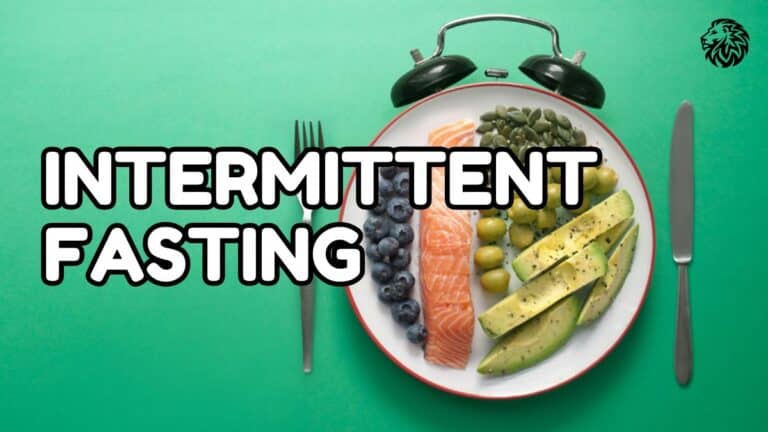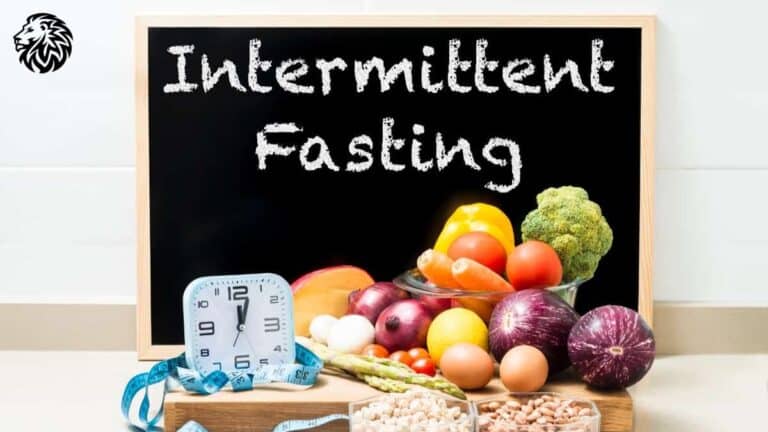You know how there’s always some new diet trend buzzing around? Well, the one that’s making waves right now is called Intermittent Fasting, or IF for short. It’s kind of unique because, instead of telling you what to munch on, it’s all about when to do your munching.
So, here’s the lowdown: with IF, you switch between times when you eat and times when you don’t. Fans of this method say it’s like giving your body a “system restart.” They believe it could tweak our metabolism and maybe even help us drop a few pounds, among other cool health perks.
What’s making IF the talk of the town? It’s not just how straightforward it is, but also because it seems to actually work! Loads of people swear by it for shedding weight. And it’s not just talk; there’s a growing stack of science backing it up too. They reckon that by not always being in “digest mode”, our bodies might burn fat better and could even get a bit of a youthful boost. Stick around, and we’ll dive deeper into the nitty-gritty of how this all works and spill the beans on how much weight you might lose in a month with IF.
How much weight can you lose in a month with intermittent fasting?

The amount of weight a person can lose in a month with intermittent fasting (IF) varies depending on several factors including:
- The type of IF regimen: There are various intermittent fasting methods, such as the 16/8 method (16 hours of fasting followed by an 8-hour eating window), the 5:2 diet (eat normally for 5 days of the week and consume only 500-600 calories on 2 non-consecutive days), and alternate-day fasting, among others.
- Starting weight: Individuals who have a higher starting weight tend to lose weight more quickly at the beginning of a diet or fasting regimen.
- Caloric intake during eating periods: Even during eating windows, it’s essential to eat a balanced diet and avoid overconsumption. If you eat excessive calories during the feeding periods, it could offset the benefits of fasting.
- Activity level: More active individuals will burn more calories, which can contribute to more significant weight loss.
- Individual metabolism: Metabolic rates vary from person to person. Some may burn calories more efficiently than others.
- Duration and adherence: Sticking to the fasting schedule and ensuring consistency will impact results.
On average, it’s generally safe and sustainable to aim for a weight loss of 1-2 pounds (0.5-1 kg) per week. Thus, in a month, a weight loss of 4-8 pounds (2-4 kg) is a reasonable estimate for many people. Some might lose more, especially if they have a lot of weight to lose initially, while others might lose less or even experience a weight plateau.
What is Intermittent Fasting?

Intermittent fasting (IF) is a dietary approach that alternates between designated periods of eating and fasting. Rather than dictating specific foods or calorie counts, IF emphasizes the timing of food consumption, working on the principle that the body undergoes different metabolic phases when digesting food and when in a fasting state.
Core Principles
- Cycling Between Eating and Fasting: IF divides time into eating windows and fasting windows. During the eating window, individuals can consume food, while during the fasting window, they abstain from caloric intake.
- Flexibility: While there are structured protocols for IF, many find that its true strength lies in its adaptability, allowing individuals to adjust their eating and fasting windows based on their lifestyles and preferences.
- Caloric Abstinence: During fasting windows, it’s essential to abstain from any caloric intake. However, non-caloric beverages like water, unsweetened tea, or black coffee are typically allowed.
Different Types of Intermittent Fasting Methods
- 16/8 Method (Leangains protocol): This is one of the most popular IF methods. Individuals fast for 16 hours each day, limiting their eating to an 8-hour window. For instance, one might eat between 12:00 pm and 8:00 pm and then fast from 8:00 pm to 12:00 pm the next day.
- 5:2 Diet: This method involves eating normally for five days of the week, then consuming only 500-600 calories on the remaining two days. For many, this approach feels less restrictive as they only have to focus on reduced caloric intake twice a week.
- Eat-Stop-Eat: This involves a 24-hour fast once or twice a week. For example, if you finish dinner at 7:00 pm and don’t eat until dinner the next day at 7:00 pm, you’ve completed a 24-hour fast. While potentially effective, this method can be more challenging for some due to the extended fasting period.
While the essence of intermittent fasting lies in the cycling of eating and fasting windows, the specific method one chooses can vary based on individual preferences and lifestyle. Each approach has its merits, and the key is to find what’s sustainable and effective for the individual.
How Does Intermittent Fasting Work for Weight Loss?

Intermittent fasting taps into our body’s natural metabolic processes to facilitate weight loss. Let’s break down the primary mechanisms:
- Role of Insulin and Blood Sugar Regulation:
- Insulin’s Function: Insulin is a hormone produced by the pancreas that allows cells to absorb glucose from the bloodstream for energy. When we eat, our blood sugar rises, prompting the release of insulin.
- Insulin and Fat Storage: High insulin levels promote fat storage by inhibiting the breakdown of stored fat. In the state of constant eating, our insulin levels can remain elevated, making it harder to use stored fat for energy.
- IF’s Impact: Extended fasting periods allow insulin levels to drop, promoting a state where the body burns stored fat for energy. This lowered insulin state can help the body access and utilize stored fat more effectively.
- Caloric Deficit and Metabolic Rate Adjustments:
- Creating a Caloric Deficit: Intermittent fasting often leads to an automatic reduction in calorie intake, as individuals tend to eat fewer meals and snack less. Consuming fewer calories than expended results in weight loss.
- Metabolic Rate Concerns: One of the common worries about caloric restriction diets is that they can decrease the metabolic rate, making weight loss harder over time. Some studies suggest that short-term fasting can actually increase metabolic rate slightly, possibly due to an increase in norepinephrine production. However, prolonged, extreme calorie restriction (not typically associated with standard IF) might reduce metabolic rate.
- Fat Mobilization and Utilization as an Energy Source:
- Shifting Energy Sources: After around 8-12 hours of fasting, glycogen (stored form of glucose) reserves in the liver start depleting. To meet its energy needs, the body then begins breaking down stored fat into molecules called fatty acids and ketones, which are then used for energy.
- Burning Stored Fat: This metabolic shift means the body taps into its fat reserves for fuel during extended fasting windows. As a result, stored fat is mobilized and burned, leading to weight loss.
In essence, intermittent fasting encourages the body to shift its primary energy source from immediate glucose to stored fat. Combined with the potential for reduced calorie intake and the favorable hormonal changes (like decreased insulin levels), intermittent fasting presents a multifaceted approach to weight loss.
Factors Influencing Weight Loss During Intermittent Fasting

While many individuals experience weight loss with intermittent fasting, the rate and amount of weight loss can vary widely. Several factors play a role in determining these outcomes:
- Starting Weight and Body Composition:
- Initial Weight: Individuals with a higher starting weight often lose weight more rapidly in the initial stages compared to those closer to their ideal weight.
- Muscle vs. Fat: Body composition, the proportion of muscle to fat, can impact metabolic rate. More muscle tends to increase the resting metabolic rate, potentially leading to greater calorie burn.
- Duration and Strictness of Fasting Windows:
- Length of Fast: Longer fasting windows, such as those in the 20/4 method, may lead to a more pronounced calorie deficit and greater fat mobilization than shorter windows like the 14/10 method.
- Adherence: The consistency and strictness with which one adheres to their fasting schedule can significantly impact results. Occasional deviations might slow down progress.
- Diet Quality During Eating Windows:
- Nutrient Density: Consuming nutrient-dense foods ensures that the body gets essential vitamins and minerals, which can support metabolic processes and satiety.
- Caloric Intake: Overeating during the feeding window can offset the caloric deficit achieved during the fast.
- Macro Composition: The balance of carbohydrates, fats, and proteins can influence satiety, energy levels, and fat mobilization. For example, a higher protein intake can support muscle maintenance and increase feelings of fullness.
- Physical Activity Levels:
- Exercise and Caloric Burn: Engaging in regular physical activity, especially resistance training, can amplify weight loss by increasing the caloric deficit and preserving muscle mass.
- Activity Type: Aerobic exercises like jogging might boost immediate calorie burn, while resistance training can support muscle growth and elevate resting metabolic rate.
- Age, Gender, and Metabolic Health:
- Age: Metabolic rate generally declines with age, which might slow weight loss.
- Gender: Hormonal differences between males and females can influence fat storage, appetite, and metabolism. For example, men typically have higher muscle mass, which can lead to a higher basal metabolic rate.
- Metabolic Health: Individuals with metabolic imbalances or conditions like insulin resistance might experience different results with IF compared to metabolically healthy individuals.
Intermittent fasting offers a structured approach to weight loss, individual outcomes are influenced by a myriad of factors. Recognizing and adjusting for these factors can help tailor the IF experience to one’s unique needs and goals.
Average Weight Loss Expectations with Intermittent Fasting

Intermittent fasting has garnered significant attention both in scientific circles and among health enthusiasts. When considering weight loss expectations, it’s essential to balance findings from scientific studies with real-world anecdotal experiences.
- Studies on Weight Loss with IF:
- Short-Term Studies: Many studies, usually spanning a few weeks to a couple of months, have shown that intermittent fasting can lead to significant weight loss. On average, these studies suggest that IF can result in a 3-8% weight loss over 3-24 weeks, making it comparable to other weight loss interventions.
- Long-Term Impact: Fewer studies have examined the long-term effects of IF on weight loss. However, those available indicate that the effectiveness of IF can be maintained with consistent adherence, but like all diets, the potential for weight regain exists if old eating habits resume.
- Comparison to Traditional Caloric Restriction: Some research suggests that IF may offer similar weight loss benefits as daily calorie restriction. However, certain individuals might find IF easier to adhere to because of its flexibility.
- Real-World Results:
- Anecdotal Evidence: Real-world experiences vary widely. Some individuals report significant weight loss within the first month, while others experience a more gradual decline. It’s common to hear of weight losses ranging from 4-10 pounds in the first month, but this can be influenced by starting weight, diet, and activity levels.
- Online Communities: Platforms like Reddit and various health forums have vibrant communities of IF enthusiasts. Here, one can find myriad personal stories, showcasing both the successes and challenges individuals face with IF.
- Variability Based on Individual Factors:
- Starting Weight: As mentioned, those with a higher starting weight might see more rapid initial weight loss.
- Diet and Adherence: Consistency in sticking to fasting windows and making nutritious food choices during eating periods will influence outcomes.
- Physical Activity: Those who combine IF with regular exercise, particularly resistance training, might see better results.
- Metabolic and Hormonal Factors: Age, gender, and individual metabolic health can cause variations in weight loss results.
Intermittent fasting has shown promising results both in scientific studies and anecdotally, individual experiences can vary significantly. Setting realistic expectations and being patient, while paying attention to one’s unique body and needs, is essential. As always, consulting with a healthcare professional before starting any weight loss regimen is recommended.
Potential Benefits of Intermittent Fasting Beyond Weight Loss

Intermittent fasting (IF) has piqued the interest of researchers and health enthusiasts not just for its weight loss potential, but also for a host of other reported health benefits. Let’s delve into some of these advantages:
- Improvements in Insulin Sensitivity and Blood Lipid Levels:
- Insulin Sensitivity: Regular bouts of fasting can enhance the body’s responsiveness to insulin, potentially reducing the risk of type 2 diabetes. As the body becomes more insulin sensitive, it requires less insulin to lower blood sugar.
- Blood Lipids: Some studies indicate that IF can lead to reductions in LDL cholesterol, blood triglycerides, and other heart disease risk factors. This suggests that IF might offer cardiovascular benefits.
- Enhanced Cognitive Function and Longevity:
- Brain Health: Fasting can stimulate the production of brain-derived neurotrophic factor (BDNF), a protein linked to cognitive function, learning, and memory.
- Neuroprotection: IF may help protect the brain against age-related diseases like Alzheimer’s and Parkinson’s. Animal studies suggest fasting can promote autophagy in the brain, a process where cells remove damaged components.
- Longevity: While most of the evidence comes from animal studies, IF has been shown to extend lifespan. The mechanisms might involve improved insulin sensitivity, reduced oxidative stress, and the activation of genes related to longevity.
- Reduction in Inflammation and Oxidative Stress:
- Anti-Inflammatory Effects: Chronic inflammation is implicated in numerous chronic diseases. Some studies suggest that IF can reduce markers of inflammation, potentially benefiting overall health.
- Oxidative Stress Reduction: Oxidative stress, a result of an imbalance between free radicals and antioxidants in the body, contributes to aging and many chronic diseases. IF might bolster the body’s antioxidant defenses and reduce oxidative damage to cells.
The potential benefits of intermittent fasting extend well beyond weight management. While many of these effects have been observed in animal studies or small-scale human trials, they provide promising insights into the multifaceted health advantages of this dietary approach. As with any dietary regimen, it’s crucial to approach IF thoughtfully, taking individual needs and medical advice into account.
Safety and Considerations with Intermittent Fasting
While intermittent fasting (IF) has been embraced by many for its potential benefits, it’s essential to consider its safety aspects and recognize that it might not be suitable for everyone.
- Who Should Avoid Intermittent Fasting?
- Individuals with Eating Disorders: Those with conditions like anorexia or bulimia might find that IF triggers or exacerbates unhealthy eating habits and obsessions around food.
- Pregnant or Breastfeeding Women: Nutritional demands are higher during pregnancy and breastfeeding, and fasting might compromise nutrient intake necessary for the mother and the child.
- People with Diabetes: While IF can improve insulin sensitivity, those on medications for diabetes, especially insulin, are at risk of hypoglycemia (low blood sugar) during fasting periods. Close monitoring and consultation with a healthcare professional are vital.
- Individuals with a History of Gallstones: Fasting might increase the risk of gallstone formation in susceptible individuals.
- Children and Teenagers: Growing bodies have distinct nutritional needs, and fasting might not be appropriate for this age group.
- Those with Chronic Health Conditions: Individuals with heart diseases, kidney diseases, or other chronic conditions should consult with healthcare professionals before starting IF.
- Possible Side Effects:
- Dizziness and Lightheadedness: Especially during the initial stages of IF, reduced calorie and fluid intake might cause dizziness.
- Hunger Pangs: Feelings of hunger, particularly during fasting windows, are expected. Over time, many people report that these sensations diminish.
- Irritability and Mood Changes: Some people experience mood swings, irritability, or even depressive symptoms, potentially due to fluctuations in blood sugar levels.
- Sleep Disturbances: Changes in eating patterns can impact sleep quality for some individuals.
- Reduced Energy and Fatigue: Especially in the beginning, some people might feel fatigued, which can affect daily activities and workouts.
- Importance of Listening to One’s Body and Making Informed Choices:
- Body’s Signals: It’s essential to be attuned to the body’s signals. If IF causes prolonged discomfort, it might not be the right approach, or adjustments may be needed.
- Flexibility: Some find that tweaking their eating and fasting windows, or alternating between different IF methods, can enhance comfort and results.
- Consultation: Before starting any dietary regimen, especially one as distinct as IF, consulting with a healthcare or nutrition professional can provide personalized guidance and address any potential risks.
While many people find success and benefits with intermittent fasting, it’s vital to approach it with an informed and cautious mindset. It’s not a one-size-fits-all approach, and individual considerations are key to ensuring safety and effectiveness.
Tips for Maximizing Weight Loss with Intermittent Fasting
To make the most out of your intermittent fasting (IF) journey, consider integrating the following strategies, which can enhance weight loss results while ensuring you maintain good health:
- Consuming Nutrient-Dense Foods During Eating Windows:
- Prioritize Protein: Including lean meats, fish, legumes, and dairy can help maintain muscle mass, boost satiety, and increase calorie burn due to the thermic effect of food.
- Healthy Fats: Avocados, nuts, seeds, and olive oil can be satisfying and promote optimal hormone function.
- Fiber-Rich Foods: Whole grains, fruits, and vegetables not only provide essential nutrients but also help with feelings of fullness and steady energy levels.
- Limit Processed Foods: Reducing the intake of sugary snacks, refined grains, and processed foods can help prevent blood sugar spikes and enhance overall diet quality.
- Combining IF with Resistance Training or Cardiovascular Exercise:
- Resistance Training: Helps preserve muscle mass, which can boost resting metabolic rate. It can also reshape the body by enhancing muscle definition.
- Cardiovascular Exercise: Great for burning calories and improving cardiovascular health. Whether it’s brisk walking, running, cycling, or swimming, find something you enjoy.
- Consistency: Aim to integrate regular workouts into your routine, adjusting intensity and frequency based on your fasting schedule and energy levels.
- Staying Hydrated and Considering Electrolyte Balance:
- Water Intake: Drinking adequate water can support metabolism, alleviate hunger pangs, and ensure optimal body function.
- Electrolytes: Fasting, especially for extended periods, can lead to electrolyte imbalances. Consider adding a pinch of salt to your water or consuming broth. Electrolyte supplements or drinks without added sugars can also be beneficial.
- Gradually Easing into Fasting Windows for Beginners:
- Start Slow: If you’re new to IF, consider beginning with shorter fasting periods, such as 12 hours, and gradually extend as you become accustomed.
- Listen to Your Body: If you feel overly fatigued, dizzy, or experience severe hunger pangs, consider adjusting your fasting window or eating a small, nutritious snack.
- Flexibility: Remember, the best fasting schedule is one that fits seamlessly into your lifestyle. It’s okay to adjust based on your daily demands, social events, or how you feel.
Incorporating these tips can help amplify the benefits of intermittent fasting while ensuring that the journey is sustainable and tailored to your individual needs and goals. Remember to be patient with yourself and prioritize overall well-being over rapid results.
Conclusion
Intermittent fasting has emerged as a popular and promising approach to weight loss, supported by a mix of scientific research and anecdotal success stories. By leveraging natural fasting windows, many have found it to be a flexible and effective method to shed pounds and reap a multitude of other health benefits.
However, the journey of intermittent fasting is deeply personal, marked by individual variability. While some may experience rapid weight loss and health improvements, others might find the journey more gradual or encounter challenges. This underscores the significance of personalization and the need to adapt based on one’s unique body, lifestyle, and health requirements.
Most importantly, it’s paramount to prioritize safety and well-being. Before embarking on any dietary regimen, including intermittent fasting, it’s essential to consult with a healthcare professional. This ensures you’re making informed choices that are in line with your health goals and any pre-existing conditions.
In essence, intermittent fasting, when approached with knowledge and mindfulness, holds exciting potential. However, like all health journeys, the focus should always be on holistic well-being rather than mere numbers on a scale.
References and Further Reading
- Johns Hopkins Medicine. (n.d.). Intermittent fasting: What is it, and how does it work? Retrieved from https://www.hopkinsmedicine.org/health/wellness-and-prevention/intermittent-fasting-what-is-it-and-how-does-it-work
- Link, R. (n.d.). Intermittent fasting 101 — The ultimate beginner’s guide. Healthline. Retrieved from https://www.healthline.com/nutrition/intermittent-fasting-guide
- Mayo Clinic Staff. (n.d.). Intermittent fasting: Does it have health benefits? Mayo Clinic. Retrieved from https://www.mayoclinic.org/healthy-lifestyle/nutrition-and-healthy-eating/expert-answers/intermittent-fasting/faq-20441303
- Fung, J. (2018, June 29). Intermittent fasting: Surprising update. Harvard Health Blog. Retrieved from https://www.health.harvard.edu/blog/intermittent-fasting-surprising-update-2018062914156
- Link, R. (n.d.). What is intermittent fasting? Explained in human terms. Healthline. Retrieved from https://www.healthline.com/nutrition/what-is-intermittent-fasting
- Palsdottir, H. (n.d.). Intermittent fasting: A detailed guide. Medical News Today. Retrieved from https://www.medicalnewstoday.com/articles/322293
- WebMD. (n.d.). Intermittent fasting. Retrieved from https://www.webmd.com/diet/a-z/intermittent-fasting
- Mattson, M. P., Longo, V. D., & Harvie, M. (2017). Impact of intermittent fasting on health and disease processes. Ageing Research Reviews, 39, 46-58. Retrieved from https://www.ncbi.nlm.nih.gov/pmc/articles/PMC3680567/







